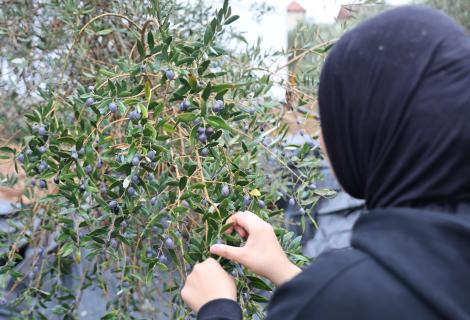ActionAid Palestine Supports Farmers in Bethlehem and Hebron During Olive Harvest Amid Escalating Settler Violence

Occupied Palestinian Territory (oPt)- ActionAid Palestine (AAP), in partnership with the Joint Advocacy Initiative of the YMCA supported Palestinian farmers during olive harvest season in the governorates of Bethlehem and Hebron by distributing tools necessary for olive picking and joining farmers by youth groups during olive picking in the village of Wad fukin in the west of Bethlehem governorate. This intervention comes at a time when settler violence has reached its highest levels in decades, turning what should be a season of livelihood and heritage into weeks of fear, loss, and uncertainty.
This support includes essential olive-picking tools including ladders, olive collection sheets, nets, and first aid kits to ensure a successful harvest, particularly for vulnerable communities and help farmers access their trees safely and sustain their harvest. This assistance aims to strengthen the resilience of communities whose land, income, and safety are increasingly under threat of Israeli settlers ’violence
The olive harvest, running from September to November, is a lifeline for thousands of Palestinian families and a deeply rooted cultural tradition. Yet many farmers in the West Bank face severe restrictions on accessing their land located near or behind Israeli settlements and military-controlled areas. Israeli authorities require special permits for farmers to reach their own groves, often limiting access to only a few days per year.
Beyond restrictions, farmers endure systematic violence. According to the UN Office for the Coordination of Humanitarian Affairs (OCHA), October saw more than 260 settler attacks resulting in injuries, property damage, or both—an average of eight attacks per day. During this year’s harvest alone, about 150 settler attacks were documented, injuring more than 140 Palestinians and vandalizing over 4,200 olive trees and saplings across 77 villages. In many cases, even Israeli and international volunteers who accompanied farmers to provide protective presence were also attacked.
These assaults not only destroy a vital economic asset but also target a symbol of Palestinian identity and endurance.
Like thousands of Palestinian farmers across the West Bank, families in Bethlehem and Hebron are experiencing growing restrictions and physical threats from settlers and Israeli forces. The olive harvest once a season of collective work and celebration has become a period marked by fear, harassment, and violence.
Farmer Elias Nakhleh Sarras from the Bethlehem area, who is unable to access his land because of settlers, says:
“For the second year, we have been prevented from harvesting our olives. We have lost so much and are unable to produce olive oil. Climate change and the lack of rainfall have also affected the olive crop and reduced our olive production.”
Farmer Mustafa Al-Hroub, from the village of Wadi Fukin located in the west of Bethlehem surrounded by Israeli settlements says:“The challenges we face are caused by the settlements surrounding our village and by Israeli occupation measures. For two years, we have been prevented from reaching our lands near the settlements, and this has deprived us of our olive harvest. The lack of rain has also had a major impact on families, depriving them of their economic income in these difficult economic conditions.
Farmer Salwa Odeh from the village of Wadi Rahal in the Bethlehem governorate, explains:
“We are exposed to constant settler violence and attacks. They come to destroy our agricultural crops and sabotage our water sources and reservoirs.”
Matilda Rashmawi, the youth volunteer groups coordinator at the YMCA, whose volunteers joined to support farmers during the olive harvest, says: “Engaging young people in the olive harvest aims to support the farmers, and involving youth in these activities strengthens our connection to this land”.
More than 100,000 families rely on the harvest for their income. It runs through to November and brings together the entire community. Palestinians use olives predominantly for oil, but every part of the tree finds a purpose: About 90 percent of olives are used to extract oil, with different regions of Palestine producing distinct varieties.
ActionAid Palestine calls for protection of Palestinian farmers, accountability for settler violence, and an end to the restrictions undermining Palestinian land rights and livelihoods.
About ActionAid International
ActionAid International is a global federation working with more than 41 million people in over 72 of the world’s poorest countries. We strive to build a just and sustainable world where every person enjoys the right to a life of dignity, freedom, and a future free from poverty and oppression. We work to achieve social justice, gender equality, and the eradication of poverty.
ActionAid Palestine began its work in Palestine in 2007 to strengthen the resilience of the Palestinian people, affirming their right to freedom, justice, and self-determination. ActionAid Palestine implements several programs in collaboration with Palestinian communities, youth groups, and women, seeking to empower women and youth and enhance their active civic and political participation. The organization works to strengthen their understanding of rights, support collective action to address rights violations resulting from the prolonged occupation and improve their leadership capacities to exercise citizenship and hold authorities and other duty-bearers accountable.
For more information, please contact:
Riham Jafari
Communications and Advocacy Officer, ActionAid Palestine
Email: Riham.Jafari@actionaid.org